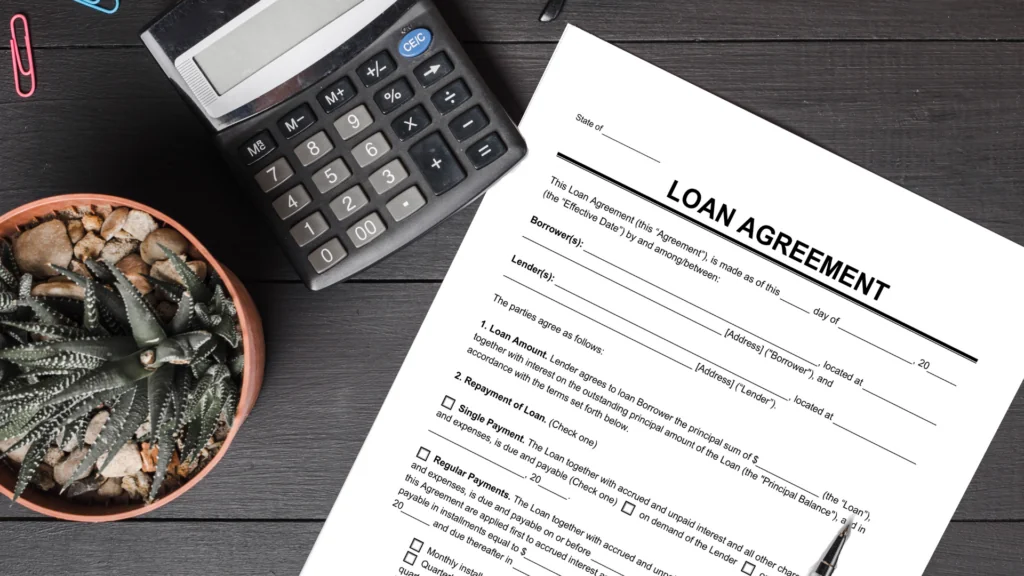- What is an IVA?
- Are You Eligible for an IVA?
- Can I Get a Loan During an IVA?
- How Does IVA Affect My Credit Score?
- Can I Settle My IVA Early?
- How Much Can I Settle to Close My IVA Early?
- Can a Gift from Someone Help You Pay Your IVA Early?
- Can I Borrow from Family or Friends While on My IVA?
- Do Homeowners Need to Remortgage in the Final IVA Year?
- Exploring IVA Alternatives
- How Can You Avoid Falling for IVA Scams?
- The Bottom Line
Can You Get a Loan While on an IVA in the UK?

Being on an Individual Voluntary Arrangement (IVA) in the UK can feel like your finances are locked up tight.
You’re managing debt, sticking to a strict plan, and borrowing more money? That’s usually a no-go.
But life doesn’t always stick to the rules.
Sometimes things break, emergencies crop up, or an unexpected opportunity comes along. And suddenly, you’re thinking about loans again.
This guide will help you understand how loans work if you’re on an IVA, what the risks are, and what steps you can take if borrowing becomes necessary.
What is an IVA?
An Individual Voluntary Arrangement, or IVA, is basically a formal deal between you and your creditors—the people you owe money to.
It’s not some casual handshake; it’s a legally binding agreement designed to help you tackle your debts in a manageable way.
Here’s how it works: a qualified professional, usually an Insolvency Practitioner (IP), sets it up.
You agree to make monthly payments for a set period, typically about five years. Once that’s done, any leftover debt is usually written off.
An IVA can be a lifesaver if you’re drowning in debt, but it’s not without its rules.
Borrowing more money while on an IVA? That’s heavily restricted. After all, the whole point is to help you clear your debts—not pile on more.
Are You Eligible for an IVA?
Thinking about an IVA to sort out your debts? There are a few boxes you’ll need to tick first. Here’s a quick rundown:
- Disposable Income– You’ll need some leftover money after paying for essentials. This shows you can stick to regular IVA payments.
- How Much You Owe – IVAs usually suit people who owe a few thousand pounds or more. The higher your debt, the more likely an IVA will work for you.
- More Than One Creditor – It’s not a hard rule, but IVAs are often used when you owe money to more than one company or lender.
- Living in the UK – You’ve got to be a UK resident to qualify for an IVA.
- Insolvency Practitioner (IP) – An IVA must be set up and managed by a qualified and licensed Insolvency Practitioner.
Even if your spare cash is low, putting down a lump sum upfront might still get you approved. But if you’re only relying on benefits, an IVA can be tricky to secure.
Keep in mind, the fees for an IVA are usually rolled into your monthly payments. For advice that fits your situation, have a chat with a qualified Insolvency Practitioner.
Can I Get a Loan During an IVA?
If you’re on an IVA, borrowing more than £500 isn’t allowed unless your Insolvency Practitioner (IP) gives you the green light.
Want to borrow £500 or less? That’s fine—you don’t need their permission.
Your IP is the person responsible for setting up and managing your IVA, so they call the shots on this. This rule applies to any kind of loan, whether it’s from a bank, a payday lender, or even your Uncle Bob.
If you’re in a bind and need more than £500, you’ll have to talk to your IP first. They’ll ask why you need the money, go over your options, and decide if it’s reasonable.
Trying to borrow without permission? Bad move. It could mess up your IVA, land you in trouble, or worse, have legal consequences.
Stick to the rules, and always check with your IP if you’re unsure.
How Does IVA Affect My Credit Score?
An IVA leaves a mark on your credit report for six years from the day it starts.
During this time, getting approved for credit or loans can be a real challenge, even if your Insolvency Practitioner (IP) gives you the go-ahead.
Lenders can check the Individual Insolvency Register, which shows all active IVAs. Because of this, traditional lenders like banks are likely to say no to your loan applications.
If you’re looking for credit, specialised lenders who work with people with poor credit histories are your best bet.
You can find them through brokers who know where to look and can match you with the right options.
Quick Tip
Before committing to an IVA, think carefully—it’s a serious, long-term arrangement. It can affect your credit score, your home, your job, and your financial future.
Weigh up all the pros and cons to make the best decision for your situation.
Can I Settle My IVA Early?
Yes, you can wrap up your IVA early if you want to get out of it before the official end date.
Usually, after about three years, you can explore getting a loan to pay off the rest of your IVA payments in one go.
Settling early means you’re free from the IVA and can start working on improving your credit sooner.
Here’s how it works: you offer your creditors a lump-sum payment to settle the debt. Once they accept, your monthly payments stop. Sounds great, right?
But keep a few things in mind:
- Your IVA will still show on your credit report for six years from the start.
- Borrowing money or getting credit could still be tricky for a while.
- You’ll need to repay the loan you used to close the IVA.
Thinking about settling early? Talk to your Insolvency Practitioner (IP).
If they think your creditors will agree, they’ll set up a meeting to discuss it.
You’ll need to explain where the lump sum is coming from—creditors won’t accept funds that were already included in your IVA, like inheritance money.
To move forward, at least 75% of your creditors need to approve the deal. Once you get their agreement, you can approach lenders who specialise in loans for early IVA settlements.
Be ready to meet their conditions, such as how long you’ve been in the IVA and whether you’ve kept up with your payments.
How Much Can I Settle to Close My IVA Early?
The amount you’ll need to settle your IVA early depends on your situation. Creditors might even have a say in what they’ll accept.
Your best bet? Offer an amount that’s close to what you still owe.
If the creditors don’t agree, no worries—you’ll just keep making your regular IVA payments as planned.
Can a Gift from Someone Help You Pay Your IVA Early?
Yes, it can. If a friend or family member wants to help by giving you some money, you can use it to pay off your IVA ahead of schedule.
But before you dive in, talk to your Insolvency Practitioner (IP). They’ll need details about the person helping you, including their ID, proof of funds, and a consent form.
Usually, extra money during your IVA just goes towards the payment plan—it doesn’t shorten the term automatically.
But if the gift is enough to clear all your debt and cover the IVA fees, you can close the whole thing early without even needing a special meeting.
Can I Borrow from Family or Friends While on My IVA?
Your IVA has strict rules—borrowing over £500, even from family or friends, isn’t allowed without permission from your Insolvency Practitioner (IP).
If you’re in a tight spot and need help, always check with your IP before doing anything.
Borrowing from loved ones can also cause problems. You might feel pressure to pay them back first, which could upset your other creditors and risk your IVA falling apart.
The bottom line? Talk to your IP before borrowing any amount to make sure you’re sticking to the rules.
Do Homeowners Need to Remortgage in the Final IVA Year?
If you own a home and have equity built up, you’ll likely need to look at remortgaging as your IVA comes to an end.
In the last year, your property’s value will be assessed to see how much equity you have.
If the evaluation shows more than £5,000 in equity, you’ll usually need to remortgage to release a lump sum for your IVA. But don’t worry—you won’t have to sell your home.
Your IVA will include guidelines on how much to borrow, based on your property value and remaining mortgage balance.
If a new mortgage would go beyond your current one or extend past your retirement age, you won’t need to remortgage.
If remortgaging isn’t an option, you’ll simply carry on making your regular IVA payments for the final year.
Exploring IVA Alternatives
An IVA isn’t the only way to tackle debt—there are other options, each with its own ups and downs depending on your situation.
Let’s break them down:
- Debt Consolidation.Struggling with lots of different debts? You can roll them into one single monthly payment. It’s simpler to manage and might even lower your overall interest rate.
- Debt Relief Order (DRO). If you’ve got no spare cash at the end of the month, a DRO might work for you. It freezes your debts for 12 months, giving you breathing space. If your situation hasn’t improved after that, your debts could be written off.
- Debt Management Plan (DMP). A DMP lets you work out affordable monthly payments with your creditors. It’s flexible and lets you pay what you can manage, but it does mean sticking to a budget.
- Trust Deed (For Scotland). If you’re in Scotland and owe more than £5,000, a Trust Deed could help. A financial manager is brought in to handle your payments, and after the agreed period, any leftover debt might be wiped out.
- Bankruptcy. As a last resort, there’s bankruptcy. It should only be considered if your debts are bigger than everything you own. It’s a serious step, so always speak to a financial expert before going down this route.
How Can You Avoid Falling for IVA Scams?
Unfortunately, not all IVA firms play fair. Here’s your quick guide to staying safe:
- Quick Sign-Ups. If they’re hurrying you to sign, step back. A proper UK IVA firm gives you time to understand the terms.
- Sky-High Fees. A legit IVA firm includes fees in your regular payments. Beware of those asking for steep upfront costs.
- Cold Calls. If a company contacts you first about an IVA, be cautious. You should be the one to make the initial contact.
In short, always do your homework before agreeing to an IVA.
The Bottom Line
Getting a loan while you’re on an IVA isn’t exactly easy.
If you need to borrow more than £500, you’ll have to run it past your Insolvency Practitioner (IP). Borrowing should really be your last option since it can make your IVA more complicated.
This is where an experienced mortgage broker who knows the ins and outs of IVAs can be a game-changer. They’ll find lenders who are open to working with you, saving you loads of time.
Even better? They’ll handle the paperwork, so you’ve got one less thing to stress about.
If you’re ready to make a smart financial move, reach out to us. We’ll connect you with a top-notch broker who can guide you through the process and help you find the best solution for your situation.
Get Matched With Your Dream Mortgage Advisor...

Frequently asked questions
What types of credit can’t I take out during an IVA?
While on an IVA, you can’t borrow more than £500 from anyone without getting permission from your Insolvency Practitioner (IP).
This includes credit cards, overdrafts, personal loans, payday loans, or even borrowing from family and friends. It’s tough to get approved for credit anyway, as your IVA and past debt defaults will show up on your credit file.
Can I join a salary reduction scheme while on an IVA?
It depends. Salary reduction schemes, like cycle-to-work plans or season ticket loans, are often treated as a form of credit. Your IP might approve it if the amount is reasonable, it serves a clear purpose, and it doesn’t mess up your IVA payments.
For example, a season ticket loan could save you money in the long run. Always check with your IP before signing up for any scheme.
Can I get a credit card during an IVA?
Getting a credit card while on an IVA is tricky and usually not worth it. Lenders are likely to either reject you or offer terrible terms.
If you really need one, you’ll need your IP’s approval. But honestly, avoiding credit during your IVA is the smarter move—it’ll help you stay on track with repayments.
What about loans after I’ve finished my IVA?
Once your IVA is over, it can still be hard to get a loan because of the impact on your credit score.
The best option is to wait until the IVA drops off your credit file, which happens six years after it started.
If you need credit sooner, consider reaching out to a local credit union instead of mainstream lenders. To rebuild your credit, make sure all your bills are paid on time and consider using a credit builder card if it fits your budget.
Can I get car finance while on an IVA?
Yes, but only if your IP agrees. Car finance might be approved if having a car is essential for your job. Make sure to get your IP’s permission first, as finance companies will ask for proof.
Can I get a mortgage after my IVA ends?
Yes, you can get a mortgage after your IVA is completed, but you’ll need to put in some work first. Improving your credit report will boost your chances of approval and help you get better deals with lower interest rates.
Getting a mortgage during your IVA is almost impossible, as you’re required to use your spare income for debt repayment.
Waiting until your IVA is over will make things much easier and better for your credit history.




